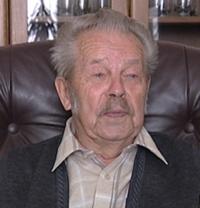“You could loose your property, but you could acquire it again. Although, in case you loose your honour, you could never buy it again, you could find it nowhere.”

Download image
Ján Okoličáni was born on June 6, 1918, in the village Okoličné in Liptov region as the only child. His father died when Ján was just thirteen-year-old boy; therefore, his mother alone raised him strictly to be honest and fair-minded man. Yet in his childhood he felt love for nature and hunting, what helped him later in his life a lot. He studied at the state grammar school in Liptovský Mikuláš and after the school leaving examination in 1937 he enrolled at the Agriculture and Forestry (Engineering) School of Higher Learning (VSZLI) in Prague. However, the beginning of the Second World War meant for him the end of his studies. In 1939 he received call-up papers and had to join up. He experienced many battles, fierce fights, hard living conditions and severe winters on the eastern front. After coming back home, he worked at the military school in Nitra where he witnessed careless handling of weapons. As he was a soldier, he took part in all the events following the Slovak National Uprising outbreak. He risked his life many times when he fought for his homeland against German armies. After coming back to his hometown, he started to farm at the destroyed family homestead. However, when it started to flourish, the year 1946 and the first post-war elections came. Then the left-wing government took the power. In the frame of collectivization they deprived him of the whole his property in a single moment. Zealous farmer suddenly transformed into a public servant. Moreover, about the year 1950 he had to face also an attempt to conscript him back to the army. He was intent on doing anything necessary to avoid being sent back to the front. For some time he worked as a liquidator of invoices at the Directorate of State Forests and Estates, but as there were some discrepancies in paying off the invoices, he asked to be relieved of his post. His wife’s friend helped him to find a job as a woodworker. In spite of many health problems and impending invalidity he kept working there till he was retired.
